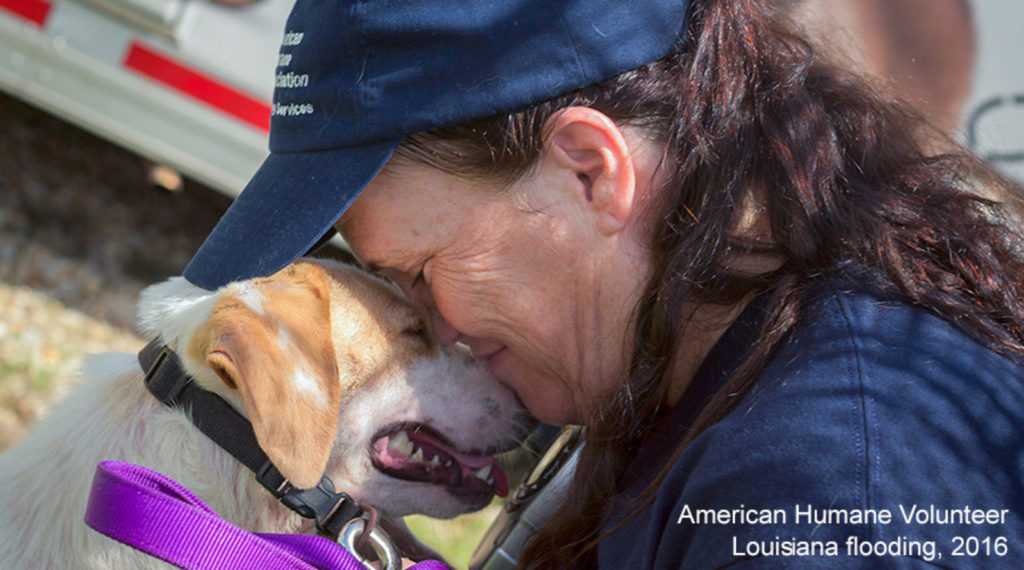Trained team and giant 50-foot animal rescue vehicle on the way to Texas; American Humane and Chicken Soup for the Soul Pet Food delivering more than 100,000 pounds of free food
As the floodwaters from monster storm Harvey continue to rise, threatening hundreds of thousands of people and animals, the American Humane Rescue team and one of its giant 50-foot emergency rescue vehicles are rushing to Texas to help animals in the affected areas. American Humane is working with Chicken Soup for the Soul Pet Food to deliver more than 100,000 pounds of free emergency food to displaced pet owners and frightened, hungry animals separated from their families.

The American Humane Rescue team is racing to Texas to help animals caught in the path of the storm, working with Chicken Soup for the Soul Pet Food to distribute more than 100,000 pounds of free food to frightened, hungry animals. (PRNewsfoto/American Humane)
American Humane is responding to an official request from the City of Orange Grove, near Corpus Christi, close to where one of the biggest storms in recent history made landfall. The team is racing to the scene to help there, and has strategically moved vital equipment into position in Louisiana, as well, which can provide rescue and shelter services in the event the storm turns eastward and hits that state.
In the meantime, knowing what to do before, during and after a deadly hurricane can mean the difference between life and death. Here, for all those affected by the 1,000-year flooding or in Harvey’s path, are some important tips from the experts on the American Humane Rescue team:
Before the storm
- NEVER leave animals behind. Review your evacuation plans and know a safe place where your pets can go if you need to evacuate. Evacuation destinations may include a friend or family member’s home, going to a pet-friendly hotel, or temporarily housing your pet(s) at a boarding facility. Plan multiple routes to your safe destination.
- Microchip your pets and properly affix a tag on your pet’s collar with your name, address and cellphone number so they may be returned quickly in case you are separated from your pets. Update your microchip registrations and pet license information to ensure its current and consider including the name and contact information of an out-of-area contact just in case you are unreachable in a disaster zone.
- Tie down or anchor outside objects that might fly about and injure someone.
- Double-check your disaster preparedness kit for your pets (e.g., First Aid kit, leashes, and pets’ carrying cases, bowls, sanitation materials, chew toy, minimum 3 days, ideally 7-10 days of food, meds, water).
- Evacuate your family and pets as early as you can and remember to take your family and your pet’s disaster preparedness kit if you do leave.
- Bring children and pets inside; bring outdoor animals inside with a carrier ready large enough to turn around and lie down comfortably.
- Have a carrier and leashes at the ready.
- If your family must evacuate, ALWAYS take your pets with you.
During the storm….if you cannot evacuate
- Choose a safe room for riding out the storm—an interior room without windows – and take your entire family there, including your pets.
- Stay with pets. If crated, they depend on you for food and water.
- Keep your emergency kit in that room with you (food, water, litter, meds).
- Know your pet’s hiding places. That’s where they may run; keep them with you.
- Secure exits and cat doors so pets can’t escape into the storm.
- Do not tranquilize your pets. They’ll need their survival instincts should the storm require that.
After the storm
- Make sure the storm has fully passed before going outside and assess damages before allowing children or animals out.
- Keep dogs on a leash and cats in a carrier, and children close at hand. Displaced objects and fallen trees can disorient pets and sharp debris could harm them.
- Give pets time to become re-oriented. Familiar scents and landmarks may be altered and cause a pet to become confused or lost.
- Keep kids and animals away from hazards such as downed power lines and water that may be contaminated.
- Uncertainty and change in the environment affect animals, presenting new stresses and dangers. Your pet’s behavior may change after a crisis, becoming more aggressive or self-protective. Be sensitive to these changes and keep more room between them, other animals, children or strangers. Animals need comforting, too. Comfort your pet with kind words and lots of pats or hugs. If possible, provide a safe and quiet environment, even if it is not their own home.
“Storms like these can be deadly for pets who are separated from their families,” said Dr. Robin Ganzert, president and CEO of American Humane. “It is important that every person and pet parent in the path of this destructive storm heed these lifesaving tips. We are working to help all of our friends in Texas and Louisiana, two- and four-legged alike, stay safe in this disaster.”
“We are pleased to be working with American Humane as relief operations in Texas and Louisiana are set in motion,” said Chris Mitchell, CEO, Chicken Soup for the Soul, Pets. “We hope the distribution of food to pets in need will help during these devastating times.”
To support the American Humane Rescue team in its efforts, please visit: http://bit.ly/2wCYv3d.

